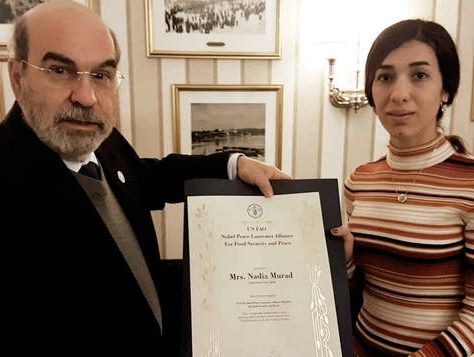Nobel Peace Prize Laureate Nadia Murad joins FAO's efforts to end hunger
 2018 awardee becomes a member of the Alliance for Food Security and Peace
2018 awardee becomes a member of the Alliance for Food Security and Peace
The Iraqi Yazidi human rights activist and 2018 Nobel Peace Laureate Nadia Murad today joined FAO's efforts to tackle the twin problems of hunger and violence by becoming a new member of FAO's Nobel Peace Laureates Alliance for Food Security and Peace.
FAO Director-General José Graziano da Silva presented Murad with a membership diploma on the sidelines of the Nobel Peace Prize ceremony, taking place in Oslo.
Murad, who became the voice and face of women who survived sexual violence by the Islamic State and doctor Denis Mukwege, a gynecological surgeon who founded a hospital in the Democratic Republic of Congo, have been awarded the 2018 Nobel Peace Prize for their campaigns against the use of rape as a weapon of war and armed conflict.
Launched in 2016, the Alliance cooperates with FAO to strengthen the link between peace and food security and is part of the agency's ongoing work to promote sustainable development and resilience across the world.
Its includes former Costa Rican president Oscar Arias Sánchez, women's rights promoter Tawakkol Karman, advocate against inter-religious violence Betty Williams, micro-credit creator Muhammad Yunus, former Colombian president Juan Manuel Santos, former president of South Africa, Frederik Willem de Klerk, and Argentinian activist Adolfo Pérez Esquivel.
No peace without food security
"We do not lack any evidence: if conflict increases, hunger increases. The relationship is direct," FAO Director-General José Graziano da Silva said welcoming Murad to the Alliance. "I thank Nadia for her engagement and put FAO at her disposal to support her work and her advocacy efforts for world peace."
Graziano da Silva stressed the role of wars and conflict as drivers of the rise of hunger in the world, and lamented that global military spending continues to increase while countries allocate scarce resources to fight against hunger.
He stressed that rural areas and their populations, particularly women, continue to be the most affected in conflicts, as attacks on farming communities undermine rural livelihoods and displace people from their homes. Assisting farmers and empowering rural women is critical to prevent widespread displacement and harassment.